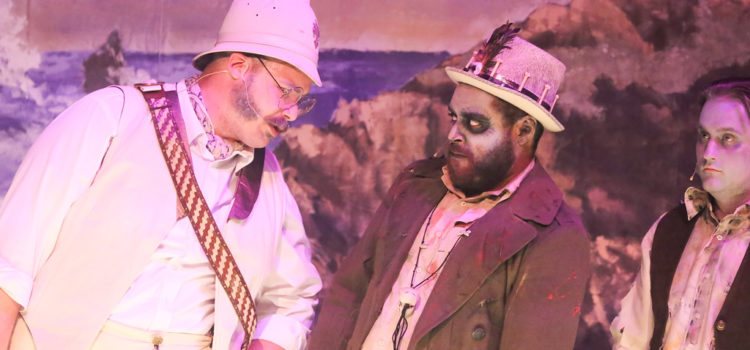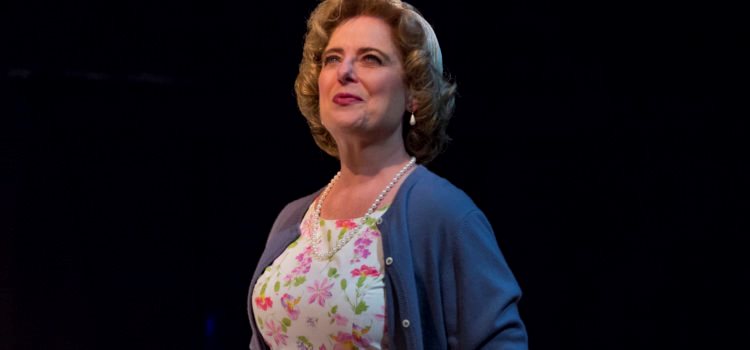By Lynn Venhaus
Managing Editor
Science Fiction, meet Musical Comedy, New Line Theatre-style, with a touch of Midnight Movie Madness.
Artistic Director Scott Miller co-directs musicals with Mike Dowdy-Windsor, and has certainly proven over the years that he beats to a different drummer. Hence, this calling card — an original and clever “The Zombies of Penzance,” where he makes the walking dead kick in a chorus line and put moves on sheltered single ladies.
These silly components make this quirky world premiere a dip into Monty Python territory. Miller has substituted singing and dancing zombies for musical comedy pirate characters, using the same structure of Gilbert and Sullivan’s famous comic opera, which makes it funnier. It may be one-joke, but it’s laugh-out-loud fun.
Turns out zombies have personalities in sync with pirates! Stranger things have happened, so just go with it, and enjoy the playful spirit. I mean, songs have titles like “Eat Their Flesh,” “Poor Walking Dead,” and “Hail, Zombies!” We can’t be serious, no matter how straight the characters play their predicaments.
The 1879 comic opera “The Pirates of Penzance,” by the British team of librettist W.S. Gilbert and composer Arthur Sullivan, was given new life in a Joseph Papp 1981 revival that won Kevin Kline the Tony as the swashbuckling Pirate King. It spawned many imitations and parodies, and a 1983 feature film. Here, you think of both those cartoonish roles and the roaming zombies that rule movie and TV screens, particularly this time of year.
The flimsy 19th century plot should be played for laughs – Frederic, 21, is released from his apprenticeship from tender-hearted pirates, but a technicality – he is a Leap Day baby — means he must serve another 63 years, but his true-love Mabel agrees to wait. We’re not talking “The Great Gatsby” level tragic romance.
Now, New Line has rewired the “Slave of Duty” to be a fresh zombie! Frederic is a new flesh eater, a pawn in the other zombie maneuvers as they aim their mark on Major-General Stanley and his nubile brood.
Let the wackiness ensue with Miller’s smart book and quick-witted lyrics, using Gilbert’s template. Listen carefully for laugh-out-loud humor, utilizing contemporary snarkiness.
St. Louis composer and orchestrator John Gerdes reconstructed Sullivan’s music, and it’s a mighty fine re-working. In music director Nicolas Valdez’s capable hands, he conducts a snazzy nine-piece band, including Gerdes on French horn, Lea Gerdes on reeds, Joseph Hendricks on bassoon, Emily Trista Lane on cello, Twinda Murry on violin and Kely Austermann/Hope Walker on reeds. Valdez is on keyboards. Their efforts are exquisite – love those strings!
Dowdy-Windsor, an oft-nominated director with Miller for St. Louis Theater Circle Awards (and winner for “Bonnie & Clyde”), also has a keen eye and sharp attention to detail.
The pair has moved the cast around – you hear the flesh-eaters before the heavily made-up zombies shamble through the audience to the Stanley home. Yet, this is not intended to be slick staging, but a motley crew invasion with a rag-tag feel.
Those dastardly decaying dudes have their eyes on Stanley’s bevy of beauties. However, Major-General Stanley, who professes to be a zombie, is actually a great zombie hunter.
Zak Farmer is as sharp as ever as the fearless father, but what stands out is his impeccable delivery of the difficult songs, particularly the often parodied “Major-General’s Song,” which is now “Modern Era Zombie Killer,” and “When the World Went Bad.” His impressive performance indicates how deceptively hard farcical fun is.
The charade will be up soon enough, but in the meantime, romantic entanglements are on the minds of those frisky young ones, who wish they were not at a disadvantage.
Dominic Dowdy-WindsorWith his strong voice, Dominic Dowdy-Windsor delivers superb vocals as the Zombie King, including the solo “Oh Better Far, to Live as Dead,” and his many duets and company numbers. Given the confines of the part, he can’t swashbuckle like the role model Pirate King, and I wish he could have more swagger.
Sean Michael and Melissa FelpsSean Michael, as the dullard Frederic, and Melissa Felps, as a rather colorless Mabel, are saddled with a drippy romance that’s the show’s centerpiece. Voices are fine and so is their earnestness, but those roles remain insipid. Their lack of chemistry doesn’t help either. (The 1981 revival starred Rex Smith and Linda Ronstadt).
So, the supporting cast’s efforts enliven the puffy piece.
The ladies play the giggly girly magnets up to a point, then reveal they’re no helpless ingenues. That’s a nice twist.
With Lindsay Jones as Kate, Christina Rios as Edith, Kimi Short as Isabel and Mara Bollini, Melanie Kozak and Sarah Porter as other daughters, you knew they weren’t going to be powder puffs, but amp up their grrrl power. Armed already with gorgeous voices, they are demure to a point, but then turn into warrior princesses.
Kent Coffel goes all in as Zombie Sam, playing everything for laughs – and he’s a delight. Other goofy zombies Robert Doyle, Matt Hill, Tim Kaniecki and Kyle Kelesoma physically turn into animated creatures.
Scenic designer Rob Lippert paid homage to George A. Romero, director of the 1968 cult classic, “The Night of the Living Dead,” the granddaddy of zombie lore, in his ornate home interior, a cool touch. The set has the period look, but also a show within a show accents.
Costume designer Sarah Porter has outfitted everyone in appropriate garb for the tonal shifts — the frilly feminine dresses and petticoats for the girls and the natty Zombie attire for the guys. Kenneth Zinkl’s lighting design emphasizes the bewitching tone while Ryan Day’s sound work makes all those fast-paced lyrics easily understood.
These zombies might not terrify, after all, but they certainly provide a fun, frothy look in a lighter vein — at both vintage opera and the horror archetypes who proliferate this time of year. Barbara, they are coming — only armed with songs, dances and feelings.
One can’t resist the pull of brainy and talented people who set out for a road not taken before.
“The Zombies of Penzance” is presented by New Line Theatre Sept. 27 – Oct. 20, Thursdays through Saturdays at 8 p.m. at The Marcelle Theater, 3310 Samuel Shepard Drive in Grand Arts Center. For more information, visit newlinetheatre.com and for tickets, call 314-534-1111 or go to MetroTix.com
Photos by Jill Ritter Lindberg

Lynn (Zipfel) Venhaus has had a continuous byline in St. Louis metro region publications since 1978. She writes features and news for Belleville News-Democrat and contributes to St. Louis magazine and other publications.
She is a Rotten Tomatoes-approved film critic, currently reviews films for Webster-Kirkwood Times and KTRS Radio, covers entertainment for PopLifeSTL.com and co-hosts podcast PopLifeSTL.com…Presents.
She is a member of Critics Choice Association, where she serves on the women’s and marketing committees; Alliance of Women Film Journalists; and on the board of the St. Louis Film Critics Association. She is a founding and board member of the St. Louis Theater Circle.
She is retired from teaching journalism/media as an adjunct college instructor.


